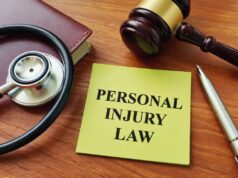
Personal injury law is a detailed and often misunderstood area of legal practice that plays a critical role in protecting the rights of individuals who have been harmed due to the negligence or wrongful actions of others. This comprehensive guide aims to provide accident victims with a clear understanding of their legal rights, the personal injury claim process, and the importance of seeking proper legal and medical assistance.
The legal processes involved in personal injury cases is critical for several reasons:
- It helps you make informed decisions about your case
- It ensures you receive fair compensation for your injuries
- It protects you from potential exploitation by insurance companies
- It aids in your physical and financial recovery after an accident
This guide will walk you through the various aspects of personal injury law, including common types of cases, the legal process, seeking compensation, and choosing the right attorney. We’ll also address frequently asked questions to provide you with a comprehensive understanding of this legal field.
Common Types Of Personal Injury Cases
Personal injury law covers a wide range of incidents where an individual suffers harm due to another party’s negligence or intentional actions. Let’s examine some of the most common types of personal injury cases.
Auto Accidents
Car accidents are one of the most prevalent causes of personal injury claims in the United States. The National Highway Traffic Safety Administration (NHTSA) reported 6,756,000 police-reported crashes in 2019, resulting in 2,740,000 injuries.
Common causes of car accidents include:
- Distracted driving (e.g., texting while driving)
- Drunk driving
- Speeding
- Reckless driving
- Poor weather conditions
- Vehicle defects
If you’ve been involved in a car accident, it’s critical to take the following steps:
- Ensure your safety and the safety of others involved
- Call the police to report the accident
- Gather evidence (photos, witness information, etc.)
- Seek medical attention, even if you feel fine
- Contact a car accident lawyer in Atlanta or your local area for legal guidance
Truck Accidents
Truck accidents, while less common than car accidents, often result in more severe injuries due to the size and weight of commercial vehicles. In 2019, the Federal Motor Carrier Safety Administration (FMCSA) reported 5,005 fatal crashes involving large trucks or buses.
Truck accidents present unique challenges in personal injury cases due to:
- Complex federal regulations governing the trucking industry
- Multiple potentially liable parties (driver, trucking company, manufacturer)
- Severe injuries often resulting in high-value claims
- Aggressive defense tactics by trucking companies and their insurers
Given these nuances, it’s critical to work with a truck crash lawyer near me who specializes in commercial vehicle accidents. These attorneys have in-depth knowledge of federal trucking regulations, experience in handling complex investigations, and the resources to take on large trucking companies and their insurers.
- Conduct a thorough investigation of the accident
- Identify all potentially liable parties
- Work through the complex web of federal and state trucking regulations
- Accurately calculate the full extent of your damages
- Negotiate with insurance companies or litigate your case in court if necessary
Workplace Injuries
While many workplace injuries are covered by workers’ compensation insurance, there are situations where a personal injury claim may be appropriate, such as:
- Injuries caused by defective equipment
- Accidents resulting from negligence of a third party (not your employer)
- Injuries due to toxic substance exposure
- Cases of employer gross negligence
Understanding your rights in workplace injury cases is key. While workers’ compensation provides benefits regardless of fault, it also limits your ability to sue your employer directly. However, in cases involving third-party negligence or extreme employer misconduct, you may have grounds for a personal injury lawsuit.
Key points to remember about workplace injuries:
The Importance Of Prompt Medical Care After An Accident
Seeking immediate medical attention after an accident is crucial not only for your health but also for the strength of your potential personal injury claim. Many injuries, particularly those involving soft tissue or internal organs, may not show immediate symptoms but can worsen over time if left untreated.
An Auto accident clinic specializing in accident-related injuries can provide comprehensive care tailored to your specific needs. These clinics often have experience dealing with the types of injuries commonly sustained in auto accidents and can provide detailed documentation crucial for your legal case.
Benefits of seeking prompt medical care include:
- Early detection and treatment of injuries
- Prevention of condition worsening
- Establishment of a clear link between the accident and your injuries
- Creation of medical records to support your claim
When visiting a Car accident injury clinic, be sure to:
- Provide a detailed account of the accident
- Describe all symptoms, even those that seem minor
- Follow all treatment recommendations
- Keep all appointments and follow-up visits
- Maintain records of all medical care and expenses
Remember, your health should always be your top priority after an accident. Prompt and thorough medical care not only aids your recovery but also strengthens your potential personal injury claim.
The Personal Injury Legal Process
Understanding the personal injury legal process can help you navigate your claim more effectively and set realistic expectations. While each case is unique, most personal injury claims follow a similar general process:
- Initial Consultation: Your first step should be to consult with a personal injury attorney. Most offer free initial consultations where they’ll evaluate your case and advise you on your legal options.
- Discovery: If a lawsuit is filed, both sides will engage in the discovery process, exchanging information about their claims and defenses. This may involve:
- Interrogatories (written questions)
- Depositions (sworn out-of-court testimony)
- Requests for documents
- Mediation or Arbitration: Before trial, there may be attempts to resolve the case through alternative dispute resolution methods like mediation or arbitration.
- Appeal: After a trial, either party may have the right to appeal the decision if there were legal errors in the trial process.
Seeking Compensation: Types Of Damages In Personal Injury Cases
In personal injury cases, “damages” refer to the compensation awarded to the injured party. Understanding the types of damages available can help you understand the potential value of your claim. Damages in personal injury cases generally fall into three categories:
1. Economic Damages
These are quantifiable financial losses resulting from the accident. They include:
- Medical expenses (past and future)
- Lost wages
- Loss of earning capacity
- Property damage
- Out-of-pocket expenses related to the injury
Economic damages are typically easier to calculate as they’re based on actual costs or projected future expenses.
2. Non-economic Damages
These damages compensate for intangible losses that don’t have a specific dollar value. They include:
- Pain and suffering
- Emotional distress
- Loss of enjoyment of life
- Loss of consortium (impact on marital relationship)
- Disfigurement or permanent disability
Calculating non-economic damages is more complex and often involves consideration of the severity of injuries, impact on daily life, and precedents set in similar cases.
3. Punitive Damages
In cases involving extreme negligence or intentional misconduct, punitive damages may be awarded. These are meant to punish the wrongdoer and deter similar behavior in the future. Punitive damages are relatively rare and often subject to statutory caps.
Factors that can influence the amount of damages awarded include:
- Severity of injuries
- Long-term prognosis
- Impact on quality of life
- Degree of fault
- Strength of evidence
- Jurisdiction and applicable laws
The Role Of Medical Treatment In Personal Injury Cases
Proper medical treatment plays a pivotal role in personal injury cases, not only for your health and recovery but also for the strength of your legal claim. Here’s why following your prescribed treatment plan is essential:
- Health and Recovery: Your primary focus should always be on your health. Following your doctor’s orders gives you the best chance at a full recovery.
- Documenting the Extent of Injuries: Consistent medical treatment creates a clear record of your injuries and their progression over time.
- Establishing Causation: Regular medical visits help establish a clear link between the accident and your injuries.
- Demonstrating Commitment to Recovery: Insurance companies look favorably on claimants who actively participate in their recovery.
- Accurate Assessment of Damages: Proper treatment helps in accurately assessing both current and future medical costs related to your injuries.
Specialized care for accident-related injuries is often necessary. These clinics can provide targeted treatment for common accident injuries such as whiplash, back injuries, or traumatic brain injuries. These clinics often have experience dealing with personal injury cases and can provide detailed documentation that supports your claim.
When seeking medical treatment after an accident:
- Be honest and thorough about your symptoms
- Follow all treatment recommendations
- Attend all scheduled appointments
- Keep detailed records of all treatments and associated costs
- Inform your doctor if your symptoms change or worsen
Remember, gaps in treatment or failure to follow medical advice can be used by insurance companies to argue that your injuries are not as severe as claimed or that you contributed to their worsening.
Statute Of Limitations And Time Constraints
The statute of limitations is a crucial concept in personal injury law. It refers to the time limit within which you must file a lawsuit after an injury occurs. If you fail to file within this timeframe, you may lose your right to seek compensation through the court system.
Key points about statutes of limitations:
- Vary by State: Each state sets its own statutes of limitations for different types of cases. For personal injury cases, these can range from 1 to 6 years, with 2-3 years being most common.
- Vary by Case Type: Different types of personal injury cases may have different time limits. For example, medical malpractice cases often have shorter statutes of limitations than general personal injury cases.
- Discovery Rule: In some cases, the clock doesn’t start ticking until the injury is discovered or should have reasonably been discovered. This is particularly relevant in cases involving latent injuries or illnesses.
- Exceptions: There are some exceptions that can “toll” (pause) the statute of limitations, such as cases involving minors or mentally incapacitated individuals.
- Government Entities: Claims against government entities often have much shorter notice requirements and statutes of limitations.
Acting promptly after an accident is important for several reasons:
- Preserves evidence: Physical evidence can disappear and witness memories can fade over time.
- Ensures timely medical treatment: Prompt medical care is essential for both your health and your legal claim.
- Allows time for thorough case preparation: Building a strong case takes time, especially if litigation becomes necessary.
- Provides negotiation leverage: The threat of litigation can encourage fair settlement offers, but only if there’s ample time before the statute of limitations expires.
Remember, while the statute of limitations sets the ultimate deadline for filing a lawsuit, it’s generally in your best interest to begin the claims process much sooner. This allows time for investigation, negotiation, and if necessary, preparation for litigation.
Common Defenses In Personal Injury Cases
Understanding common defenses in personal injury cases can help you anticipate potential challenges to your claim. Here are some defenses frequently used by defendants and their insurance companies:
1. Comparative Negligence
This defense argues that the plaintiff (injured party) was partially at fault for the accident or their injuries. There are two types of comparative negligence:
- Pure Comparative Negligence: Your compensation is reduced by your percentage of fault, but you can still recover even if you’re 99% at fault.
- Modified Comparative Negligence: You can only recover if you’re less than 50% (or in some states, 51%) at fault.
For example, if you’re found to be 30% at fault in a car accident case, your compensation would be reduced by 30%.
2. Assumption Of Risk
This defense argues that the plaintiff knowingly and voluntarily assumed the risks associated with a particular activity. It’s commonly used in cases involving:
- Sports injuries
- Dangerous activities or extreme sports
- Injuries at events with clear warnings about potential risks
3. Pre-existing Conditions
Defendants may argue that your injuries were caused by pre-existing conditions rather than the accident in question. While having a pre-existing condition doesn’t bar you from recovery, it can complicate the process of proving causation and damages.
4. Failure To Mitigate Damages
This defense argues that the plaintiff failed to take reasonable steps to minimize their losses after the injury. Examples might include:
- Not seeking prompt medical treatment
- Ignoring doctor’s orders
- Engaging in activities that worsen the injury
5. Statute Of Limitations
As discussed earlier, failing to file a lawsuit within the statutory time limit can be a complete defense to your claim.
6. Lack Of Causation
The defendant may argue that their actions didn’t actually cause your injuries. This often involves bringing in expert witnesses to dispute the link between the accident and your claimed injuries.
7. No Duty Owed
In negligence cases, the defendant must have owed you a duty of care. If they can prove they had no such duty, they may avoid liability.
Understanding these defenses can help you:
Settling Vs. Going To Trial
One of the most significant decisions in a personal injury case is whether to settle or go to trial. Both options have their pros and cons, and the right choice depends on the specific circumstances of your case.
Settlement
Most personal injury cases are resolved through settlement rather than trial. In a settlement, you agree to accept a certain amount of compensation in exchange for releasing the defendant from further liability.
Pros of settling:
- Faster resolution
- Guaranteed compensation
- Lower legal costs
- Less stress and uncertainty
- Privacy (settlements are typically confidential)
Cons of settling:
- Potentially lower compensation than a trial verdict
- No public accountability for the defendant
- No legal precedent set




